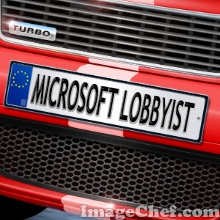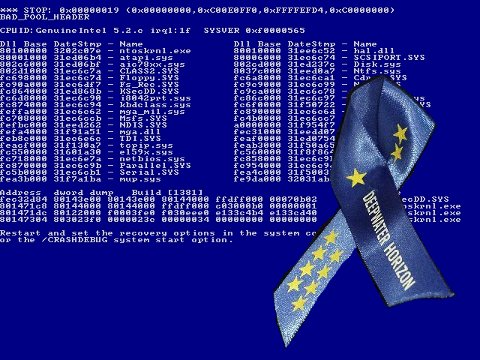08.25.11
Links – Wikileaks Betrayed, Germany’s East Texas, Spying
Reader’s Picks
-
GIMP is Gimped
There is good news for long-time GIMP users, the latest version of GIMP (v2.7.3) is out at it brings with it the most needed feature, single window mode.
The new splash, with the gimp fox in a cage and a black leather wearing goat, better matches my feelings. Thankfully, the new interface is not a default setting.
-
A Tipping Point
Until now, the USA has been the power in IT. They bought the most of everything so they could tell the OEMs what to make. July, 2011 changed that. China bought more PCs than USA.
Microsoft’s influence will decline no matter how friendly they have been with Communist China. Not only is the US business low margin, it’s now second rate. Microsoft’s US retail strangulation will now only be able to make the US market suck rather than the world market.
-
Cablegate
-
Daniel Domscheit-Berg, who stole many as yet unpublished leaked documents from Wikileaks in 2010, has destroyed many or all of them.
Thanks to his betrayal, we will not get to see the US no-fly list. The Chaos Computer Club has expelled him for trying to use their name to promote his own nebulous substitute for Wikileaks. [Open Leaks] Here is a discussion of the implications of his actions. Since a year ago, we have seen many people and organizations make accusations against Wikileaks. Domscheit-Berg’s accusations, coming as they did from an insider, sounded very bad. But now we see that he cannot be trusted and his accusations should not be believed. There are reports he is cooperating with the FBI. Perhaps his sabotage of Wikileaks’ operations and his accusations were all part of that “cooperation”.
The destroyed file list also includes US intercept arrangements for over a hundred internet companies and 5GB of Bank of America leaks. Daniel started dating and married a “Director of Government Relations” for Microsoft Germany and things went downhill from there.
-
-
Environment/Energy/Wildlife
-
Fukushima slows it’s spew but 80,000 people living near Fukushima face permanent eviction.
Last week the company estimated that leaks from all three reactors had dropped significantly over the past month. … signs of progress at the plant have been tempered by widespread contamination of soil, trees, roads and farmland. … radiation accumulated over one year at 22 of 50 tested sites inside the exclusion zone would easily exceed 100 millisieverts, five times higher than the safe level advised by the International Commission on Radiological Protection.
-
-
Anti-Trust
-
Troll Town, Why Apple Went To Dusseldorf
Patent-holding plaintiffs won 63% of all infringement cases in Dusseldorf between 2006 and 2009, according to recent research by the Global IP Project, a series of studies initiated by the law firm Finnegan. That’s well above the global average of 35%. According to ManagingIP.com, about 60% of patent litigation in Germany’s 12 district courts takes place in Dusseldorf, and cases here often set precedents for when patent-holders sue in other parts of the world, on the same complaint.
How embarrassing for everyone involved, especially Apple which mostly lost. Dusseldorf is not as bad as East Texas where 80% of software patent holders hit the judicial extortion jackpot but no software patent should been granted, ever. PJ adds, “In short, it is where you go to win because the court tips in your direction even when it probably shouldn’t.”
-
Bringing an Unloaded Knife to a Gunfight
That’s what Oracle has done in its suit against Google. Google asked for re-examination of the patents and the patents are falling like flies. Two more patents have been rejected on the grounds that they were obvious. So far 92% of the claims in the patents that have been examined have been rejected.
-
-
Censorship
-
One student was suspended and another expelled from Saint Andrews, Scotland, and convicted of a of a racist breach of the peace for insulting a fellow student and a flag.
Donnachie needs to learn that he does no good for the cause of peace by being crude. However, what he said about Israel is simple truth. Israel has committed acts which perfectly fit the usual definition of terrorism: for instance, the bombing of civilians in Gaza with the aim of making them drop their support for Hamas. Violence against civilians for a political purpose. There is no reason to believe that the Israeli student Reitblat is personally a terrorist, so Donnachie owes him an apology for that. However, to punish mere insult as a crime violates the basic human right of freedom of speech.
The racist policies of Israel and the continued humanitarian crisis in Gaza may remind people of another nationalist state that ran concentration camps. Reaction to the symbols of that oppression might be similar. Polite but forceful expressions of disgust make a difference.
-
-
Privacy
-
One judge gets it.
Does the government violate the Constitution when it obtains location data without meeting the Fourth Amendment’s “probable cause” standard? Some courts have found that it does not. But in a 22-page opinion, Judge Garaufis analyzed and rejected these other courts’ arguments, holding that law enforcement needs a warrant to obtain months of location data. “The fiction that the vast majority of the American population consents to warrantless government access to the records of a significant share of their movements by ‘choosing’ to carry a cell phone must be rejected,” he wrote. “In light of drastic developments in technology, the Fourth Amendment doctrine must evolve to preserve cell-phone user’s reasonable expectation of privacy in cumulative cell-site-location records.”
-
Comscore, a company that often lies for Microsoft about gnu/linux and search engine market share, has privacy problems now. ComScore’s Main Web Tracking Tool Hit With Privacy Lawsuit
A new lawsuit alleges that the company’s primary strategy for getting that data—composing a “panel” of more than 2 million users who install comScore software on their computers—is a serious violation of those users’ privacy. … comScore gets people to sign up for its software by offering sweepstakes enrollments and prizes, as well as free computer games. … the company’s disclosures aren’t good enough. For instance, the suit alleges that comScore software scans PDF and word-processing files on the computers of those who use it; and that it even scans files of other computers via local networks.
Population bias much? You would have to be both a Windows user and/or as dumb as a post to sign up for comScore. No wonder they always report that less than 1% of desktops are gnu/linux. I wonder when someone will sue Microsoft using Cutt’s proof that Windows is spyware. Lawyers specializing in this sort of thing need to get to the root of the problem.
-
-
Civil Rights
-
Profit Motive Underlies Outbreak of Immigration Bills
Thanks to the release of over 800 pieces of “model legislation” by the Center for Media and Democracy, we can now pinpoint the source of the outbreak [of anti-immigrant bills] to the American Legislative Exchange Council (ALEC) … for-profit corporations operate about half of all immigrant detention facilities … Immigration bonding can be even more profitable than regular bail bonding … An immigrant contesting their deportation can wait up to a year for a hearing [without a criminal record]
-
Anti-immigrant laws have left more than a billion dollars in food to rot in the field as labor flees. Alabama takes a special place as the worst in the country.
Concerned parents are afraid to register their children in schools. Many Hispanics are worried to drive, out of a fear that they will be stopped. By involving the police in immigration enforcement, Hispanic activists say crimes will go unreported as people will not come forward in case their immigration status is checked.
The rich and powerful in Alabama have given themselves an exploitation exemption and won’t be criminals if their household staff is undocumented.
-
Since 9/11, Koch Industries has fought against tougher government rules on chemical plants
Koch is a leader in efforts to oppose counter-terrorism proposals that would require that petrochemical firms use less hazardous practices and chemicals. … [his industrial group] owns 56 facilities using hazardous chemicals that put 4.8 million Americans who live nearby at risk. … Koch argues that tough restrictions on petrochemicals aren’t necessary because there hasn’t been a terrorist attack here since 9/11
Remember that while explaining your shampoo, handing over your computer and stepping into an x-ray at the airport. You can also think about the place your communications have in Total Information Awareness programs.
-
The FBI has built a massive network of spies to prevent another domestic attack. But are they busting terrorist plots—or leading them?
Ever since 9/11, counterterrorism has been the FBI’s No. 1 priority, consuming the lion’s share of its budget—$3.3 billion, compared to $2.6 billion for organized crime … the bureau now maintains a roster of 15,000 spies—many of them tasked … with infiltrating Muslim communities in the United States. [there are three nonofficial for every official informant] … The main domestic threat, as the FBI sees it, is a lone wolf. … Federal law enforcement went from a focus on fighting crime to preventing crime … they can go into houses of worship without probable cause
They are chasing ghosts and entrapping incompetents who would pose no problem otherwise using people facing criminal charges.
-
-
Intellectual Monopolies
-
Google: Just In Case
The weak cannot grant peace. Only the strong can. … In a sense, the better Google can enforce exclusivity if it wants to, the more open it may be able to become.
This is a wonderful description of “defensive patents” that explains everything that’s wrong with software patents. Courts should provide justice, not some kind of money wasting contest. No one should need permission to share software because governments should not grant monopolies on the ideas needed to implement software as if methods and math were inventions. Such chest thumping rhetoric conceals cowardice and apathy when it comes to demanding a just world.
-






















 Content is available under CC-BY-SA
Content is available under CC-BY-SA